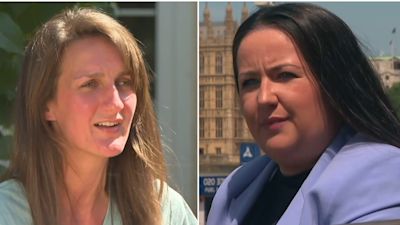Insight
Inside the fight for all UK parents to get paid miscarriage leave

ITV News Health Editor Emily Morgan reports on the calls for paid leave for parents who lose a baby in the earlier stages of a pregnancy
I think it’s fair to say that women have, throughout history, had to fight hard for pretty much everything. That's whether it was for the right to vote, the right to be educated, the right to work and more recently the right to have time off after having a baby.
It strikes me then as rather incredible that in today’s modern, "equal" society women again are having to fight for certain employment rights. And they’re not fighting for just women this time, but men too.
Did you know that when a woman has a miscarriage, up to and until 24 weeks, neither she nor her partner have any legal entitlement to leave or pay?
If the pregnancy is beyond 24 weeks it is classed as a "stillborn" and parents and partners qualify for two weeks statutory bereavement leave and pay.
But 23 weeks and six days? Nothing.
In these cases it is up to the employer to offer compassionate leave, sick leave or unpaid leave. Let’s hope employers are understanding then, because one in four pregnancies end in miscarriage. It’s this rather outdated and dispassionate take on miscarriage that has led one MP to lead the fight and introduce a Private Members Bill aimed at changing the law on miscarriages.
Angela Crawley, an SNP MP, introduced her bill last year, prompting a debate around the issue. She wants all employees to have the legal right to a minimum of three days paid leave if they or their partners have a miscarriage. It isn’t much but it seems to be too much to ask the government to back it.
In fact, they appear to be happy to allow companies to take their own stance on it.
'A miscarriage is a loss and a bereavement', MP Angela Crawley explains
But how does that work if the employee doesn’t feel able to talk about their loss? What if they feel like they’re overreacting in asking for time off? Wouldn’t employment rights, specifically for miscarriages, give everyone the confidence to speak openly about it and ensure no employer can refuse paid leave?
I spoke to Gina who believes just that.
She miscarried her first baby at 13 weeks in 2011. She was working in a call centre and distinctly remembers the conversation she had with her two bosses. She needed a hospital procedure, she would need some time off, and informed them she wouldn’t be able to work her next few shifts.
Gina wasn’t offered any sympathy, they were more concerned about who would cover her shift and which day she would be back because they would be short staffed.
This attitude and the "shame" they made her feel led her to resign.
It proves, Gina says, that in the long run it is better to look after workers, as this leads to happier, healthier members of staff.
Gina says her workplace 'made her feel ashamed' when she told them about her miscarriage
I spoke to the tech firm Monzo about this. It offers its workers two weeks leave if a miscarriage has occurred.
I asked why, and the answer was simply "because it’s the right thing to do". It’s difficult to argue with that isn’t it?
Pregnancy loss can be a distressing and traumatic experience. Perhaps few of us know that because so few of us feel like we can talk about it openly, especially at work.
A policy like Monzo’s - or indeed John Lewis or the Co-op’s - sends a very clear message that they recognise the loss of a baby can be a very difficult time in someone’s life and gives reassurance to staff that they will be supported. Of course, the UK is not the only country not offering such leave. But it is behind many others who have either brought it in or are seriously thinking about it.
New Zealand has just done it, India has a well established policy, so too does Nicaragua.
There will always be small businesses that will argue they cant afford it, and the government might well continue to argue that right now it doesn’t want to burden companies anymore than it has to.
But at some point someone has to ask, can they afford not to?
Where to get support if you, your partner or someone you know has had a miscarriage
Your GP can provide you with support and advice
The Miscarriage Association is a charity that offers support to people who have lost a baby. They have a helpline (01924 200 799, Monday to Friday, 9am to 4pm) and an email address (info@miscarriageassociation.org.uk)
Cruse Bereavement Care helps people understand their grief and cope with their loss. They have a helpline (0808 808 1677, Monday to Friday, 9:30am to 5pm) and a network of local branches where you can find support
Want a quick and expert briefing on the biggest news stories? Listen to our latest podcasts to find out What You Need To Know